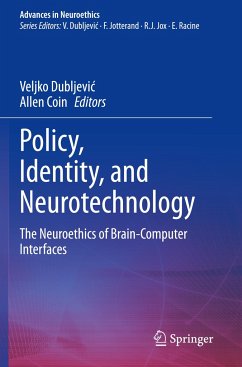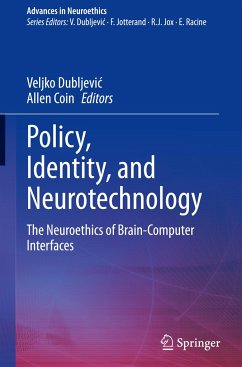
Clinical Neurotechnology meets Artificial Intelligence
Philosophical, Ethical, Legal and Social Implications
Herausgegeben: Friedrich, Orsolya; Wolkenstein, Andreas; Bublitz, Christoph; Jox, Ralf J.; Racine, Eric

PAYBACK Punkte
82 °P sammeln!
Neurotechnologies such as brain-computer interfaces (BCIs), which allow technical devices to be used with the power of thought or concentration alone, are no longer a futuristic dream or, depending on the viewpoint, a nightmare. Moreover, the combination of neurotechnologies and AI raises a host of pressing problems. Now that these technologies are about to leave the laboratory and enter the real world, these problems and implications can and should be scrutinized.This volume brings together scholars from a wide range of academic disciplines such as philosophy, law, the social sciences and neu...
Neurotechnologies such as brain-computer interfaces (BCIs), which allow technical devices to be used with the power of thought or concentration alone, are no longer a futuristic dream or, depending on the viewpoint, a nightmare. Moreover, the combination of neurotechnologies and AI raises a host of pressing problems. Now that these technologies are about to leave the laboratory and enter the real world, these problems and implications can and should be scrutinized.
This volume brings together scholars from a wide range of academic disciplines such as philosophy, law, the social sciences and neurosciences, and is unique in terms of both its focus and its methods. The latter vary considerably, and range from philosophical analysis and phenomenologically inspired descriptions to legal analysis and socio-empirical research. This diversified approach allows the book to explore the entire spectrum of philosophical, normative, legal and empirical dimensions of intelligent neurotechnologies.
Philosophical and legal analyses of normative problems are complemented by a thorough empirical assessment of how BCIs and other forms of neurotechnology are being implemented, and what their measurable implications are. To take a closer look at specific neurotechnologies, a number of applications are addressed. Case studies, previously unidentified issues, and normative insights on these cases complement the rich portrait this volume provides.
Clinicians, philosophers, lawyers, social scientists and engineers will greatly benefit from the collection of articles compiled in this book, which will likely become a standard reference work on the philosophy of intelligent neurotechnologies.
This volume brings together scholars from a wide range of academic disciplines such as philosophy, law, the social sciences and neurosciences, and is unique in terms of both its focus and its methods. The latter vary considerably, and range from philosophical analysis and phenomenologically inspired descriptions to legal analysis and socio-empirical research. This diversified approach allows the book to explore the entire spectrum of philosophical, normative, legal and empirical dimensions of intelligent neurotechnologies.
Philosophical and legal analyses of normative problems are complemented by a thorough empirical assessment of how BCIs and other forms of neurotechnology are being implemented, and what their measurable implications are. To take a closer look at specific neurotechnologies, a number of applications are addressed. Case studies, previously unidentified issues, and normative insights on these cases complement the rich portrait this volume provides.
Clinicians, philosophers, lawyers, social scientists and engineers will greatly benefit from the collection of articles compiled in this book, which will likely become a standard reference work on the philosophy of intelligent neurotechnologies.












